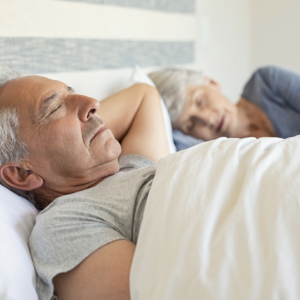Time It Right: Optimal Sleep Practices As You Age

Time It Right: Optimal Sleep Practices As You Age
May 4, 2022
By now you probably know that getting sufficient sleep is one of the essential pillars of healthy aging. Ironically, as you age, you are more likely to have trouble falling asleep or staying asleep than when you were younger. The question is, how much nightly sleep should you ideally aim for, and what, if anything, can be done to enhance your prospects for a restful, restorative night? This is not just idle talk. Getting sleep is essential for your health and well-being, especially in your later years. As one expert definitively states, “It’s very clear that the processes that go on in our brain during sleep are very important for maintaining our physical and mental health.”
So what’s the magic number of hours per night? New research out of the UK and China suggests that the ideal number of hours for those in middle age and older is 7 hours of sleep per night. Less than 7 or much in excess of 7 appear to be associated with poorer cognitive performance and mental health. Looking at data from over 500,000 people ages 38-73, researchers were able to discern that 7 hours per night provides exactly what your brain needs to sufficiently rid itself of toxins that build up and allow for sufficient “deep sleep” which supports memory consolidation. The area of the brain most affected by sleep is the hippocampus region, which is the brain’s memory center. While scientists were not able to prove cause and effect, nor can they really explain why too much sleep would affect cognitive performance, they are quite confident that getting your 7 hours every night (and yes, getting consistent sleep each night is also beneficial) is “as important as getting exercise” in pursuit of healthy aging. To find out more, pull out your PJs and read here.
What else can help with your sleep hygiene? NPR recently reported on the negative consequences of even modest light coming into the room in which you sleep. Apparently, even one night of modest light exposure during sleep can have deleterious consequences on your cardiovascular health. As one researcher noted, “People think that as long as they fall asleep and are unconscious, (the light is) not having physiologic effects but that’s simply not true.” So turn off that tv before you close your eyes and click here. And do you worry about getting enough of that “deep sleep” during which toxins are swept away, cells are repaired and information is processed in your brain? There’s lots of good advice as to what you can do to facilitate deeper sleep during your night, including gentle stretches to reduce stress and inflammation, a hot bath, white or pink noise, and aerobic exercise (though not close to bedtime). To find out more, start filling the tub and click here.
Finally, what’s your preferred position? Are you on your back, tummy or do you move from side to side? Each sleep position can affect the soundness of your sleep (not to mention the stiffness of your morning wake-up). To find out more, roll over and read here.







